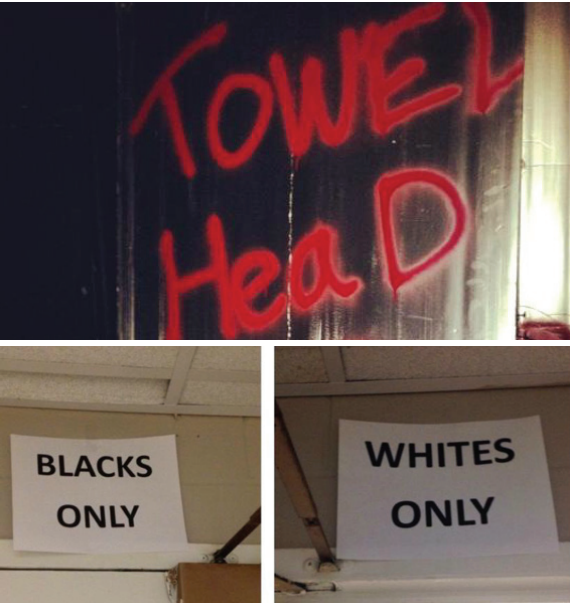Tunnel Of Oppression: More Than Just A House Of Horrors
The above images feature instances of oppression displayed in this year’s Tunnel of Oppression presentation
Swastikas and racial slurs ordained the removable, metal partitions that divided Willcox’s unlit gym, just as the words themselves continue to do to people globally. Signs that separated students by skin color hung above the gym’s entrance; yet another platform for further segregation. Pace students followed the night’s tour guides up and down the building’s stairs as they watched their peers recreate scenes of prejudice and oppression, quickly escalating to violence and resulting in tears.
Since its 2007 inception, The Tunnel of Oppression has served as a medium to address the complex issues of segregation, oppression and violence in a multifaceted approach, according to Vice President of Unity and Social Justice, Qadry Harris, who began his planning last November.
This year, the Tunnel followed Pace’s university wide “50 Years” theme and incorporated some matters from half a century ago.
“Sometimes [people] get really comfortable with oppression, and we forget how dangerous and serious it can be,” said junior childhood education major Abigail Bucknor, who also served as an actress in the event. “In a way, we shock people into realizing that this stuff happens every day”.
The event offered six sessions split evenly between Wednesday and Thursday nights, in which over 200 individuals participated. Director of Multicultural Affairs and Diversity Programs Cornell Craig and Associate Director of Student Development and Campus Activities, Shawn Livingston attended as the night’s faculty advisors while students Kelsey Laro and Jon Calixto acted as the “tour guides”.
Among the skits performed were a domestic dispute between Ike and Tina Turner, a racial conflict between young African American females, a disabled student being bullied, a Jewish female taunted for her weight, religion and emotions and even an instance of gun violence.
“Sometimes things aren’t as dramatic and are often times negative slights and comments,” said Craig, who has been working to perpetuate the Tunnel of Oppression since 2009. “The key point of the event is not to showcase a house of horrors, but for students to consider how they will react the next time they come across an act of oppression.”
One more contemporary story was a reenactment of sophomore Rachel Aviles’ departure from her Christian high school where administration accused her of homosexuality and encouraged her to leave. Aviles was approached by Harris who asked if her story could be incorporated into the script after hearing her share it publicly.
Aviles’ skit struck a chord with many audience members, one of which was junior biology major Joselyn DeWitt.
“[Aviles] is such an amazing person and to know she had to go through that kills me,” said DeWitt, who is Aviles’ roommate and considers Aviles to be her “twin”. “Thursday night I looked to the back of the room when she was on her tour and saw her break down into tears, and that made me more emotional than me watching the reenactment myself the night before.”
Each session concluded with a debriefing period led by Craig and Livingston. Participants filled out surveys regarding their experience with the program and discussed what was most impactful to them.
“You never know what people are hiding,” an anonymous participant said. “You don’t know who feels what. I think it opened eyes up to diversity, and for people to be aware of oppression.”
Harris speculated that not all participants necessarily understood the event’s educational objective, however, he feels that if the concepts resonated with one just one person, then for that one person the annual event is worth throwing.
“[Tunnel of Oppression] absolutely has to continue as a tradition here,” said Harris, who claims to have faced “harsh and unfair criticism” against the event. “This is definitely the most well attended SGA program I’ve had all year and I think it’s been a staple since the [VP of Unity and Social Justice] position was created. I was really happy with the turnout, the product and actors worked hard; they were phenomenal.”
Craig does not foresee the Tunnel of Oppression’s final years any time in the near future.
“There is more work to be done,” Craig said. “There will always be someone who will not be benefiting.”
The 2015 Tunnel of Oppression will be produced by Aviles, who will be serving as the next VP of Unity and Social Justice.
Your donation supports independent, student-run journalism at Pace University. Support the Pace Chronicle to help cover publishing costs.


